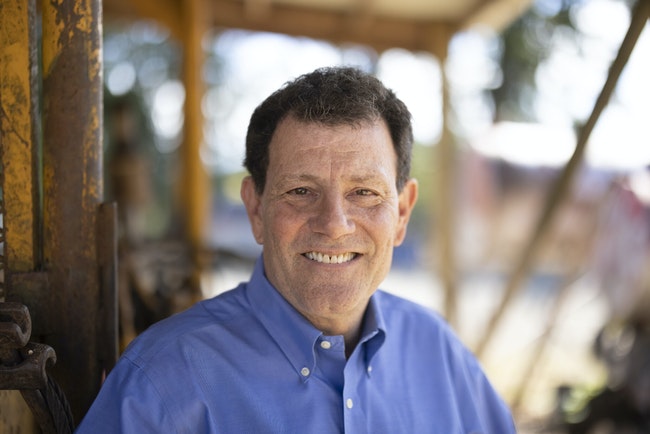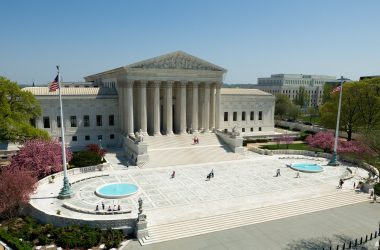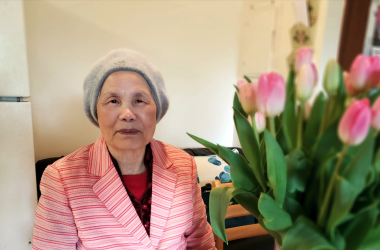
Nick Kristof, pictured on his farm in Yamhill on Sept. 11, launched his campaign for governor on Wednesday, Oct. 27. (David Hume Kennerly/Center for Creative Photography at the University of Arizona)
Democratic gubernatorial candidate Nick Kristof asserted Friday he paid Oregon income taxes as a full-year resident beginning in 2020, addressing a question raised about whether he is qualified to run.
He made the disclosure in a lengthy court filing urging the Oregon Supreme Court to restore him to the ballot.
The 54-page legal brief filed Friday night largely repeats legal arguments Kristof and his attorneys have made since August, shortly after the former New York Times columnist began publicly pondering a run for governor of his home state.
After he formally filed for office late last month, Secretary of State Shemia Fagan determined that he didn’t meet a constitutional standard that candidates for governor reside in Oregon for three years prior to the election and therefore could not appear on the Democratic primary ballot in May.
State attorneys will present Fagan’s case to the Supreme Court in a brief next week, and the court is expected to rule sometime after Jan. 26. To restore Kristof to the ballot, the Supreme Court must decide by March 17 to meet the deadline for setting ballots for printing.
“The process for determining Kristof’s eligibility was highly irregular and departed from decades of past practice by the Secretary of State’s office,” Kristof said in his filing.
He argued that Fagan made three mistakes. She misread the Oregon Constitution, she ignored his view of Oregon as home, and her decision violates the U.S. Constitution. The filing traces constitutional history and legal cases from across the U.S. to support the claim that Kristof deserves to be on the ballot.
The filing hinted at the political turmoil in the country as another reason to overturn Fagan.
“The growing threat to democratic choice and the electorate’s interest in guarding against that threat is a ‘modern circumstance’ warranting consideration,” the filing said.
Kristof’s attorneys acknowledged that he has lived most of his adult life outside of Oregon, returning to his family farm outside the rural community of Yamhill during most summers. He bought a home in Scarsdale, New York, in late 1999 and registered to vote in New York in 2000, continuing to vote in New York elections until 2020.
The day after he filed for office, a compliance specialist in the state’s Elections Division contacted Kristof to say she needed further information to process his filing.
“Please provide any documentation or explanation in addition to your published legal memo that demonstrates you have been a resident of Oregon for three (3) years preceding the November 8, 2022, general election,” Lydia Plukchi wrote.
Kristof and his attorneys responded with a 102-page document with legal arguments, clips of columns and interviews in which he referred to Oregon as home and a brief from a former Oregon Supreme Court justice supporting his case. He did not include any tax returns, images of mail or documents related to his Oregon business interests, though he referred to those documents in an affidavit.
Fagan said the lack of supporting documents, such as tax returns, and the evidence that Kristof voted in New York in 2020 created a clear case for barring him from the ballot. Among other things, she said, he asserted that he paid Oregon income taxes in recent years but didn’t indicate whether he did so as a full-year resident, part-year resident or nonresident.
His legal filing states that he paid taxes as a part-year resident in 2019 and as a full-year resident in 2020.
It also tackled a key element of Fagan’s decision – his November 2020 vote in New York elections.
“Kristof registered and voted in New York – despite also residing in Oregon – as a simple matter of convenience since he expected to be present there during more elections,” the brief said, though he said in earlier filings he voted by absentee ballot.
“Not only was it legal for Kristof to vote in New York, it is consistent with him having treated the Kristof farm as home,” the filing said. Kristof hasn’t addressed in his legal filings why he wasn’t voting in Oregon elections.
In their brief to the Supreme Court, Kristof’s attorneys wrote that Fagan “drew inferences from evidence and facts not in the record.”
“[T]he secretary never requested that information – Kristof happily would have provided it – and the record contained direct evidence that Kristof was living and working much of 2019 and 2020 in Oregon,” the brief said.
Kristof ignored requests from the Oregon Capital Chronicle last month for redacted versions of tax returns and other documents he cited in his affidavit. He said during a press conference that he did so to “honor” election officials’ review.
While the brief again refers to his tax records and business involvement, Kristof’s attorneys did not provide those documents to the court because the court said it would decide the matter based on legal arguments and the facts presented to Fagan’s office. That puts into question whether the court would consider Kristof’s belated representation about his Oregon tax status.
The brief states that “an Oregon limited liability company was formed to hold their interest in the farm and they hired three people to work the farm,” but it does not explain Kristof’s role in the company. Kristof’s wife, Sheryl WuDunn, is listed in state records as the only member of the company, and it has no worker’s compensation information on file with the state. Kristof has declined to produce records or answer questions from the Capital Chronicle about those matters.
According to the brief, Kristof and WuDunn have lived at the farm “with more continuity” since 2018, when they returned to Yamhill to write a book about his classmates. In an October 2019 interview with the Oregonian about transitioning the farm from a cherry orchard to a vineyard and apple orchard, he suggested he was still living in New York.
“…it has been a challenge to manage all of this while living 3,000 miles away,” Kristof said.
He also listed his Scarsdale address on an August 2020 application for water rights on the farm and had property tax statements for his Oregon holdings sent to New York until last year.
Kristof asserts that he has always considered Oregon home, despite living elsewhere, and that he meets standards to run for governor because he never intended to “abandon” the farm.
“Nothing about voting or sojourning outside of Oregon – while simultaneously maintaining close ties and a home in Oregon – shows that a candidate is less than knowledgeable about Oregon, a stranger to the state, or uninterested in Oregon affairs,” the brief said. “Kristof is a prime example: even though he voted and traveled outside of Oregon, he has always been – and continues to be – intimately involved and dedicated to serving Oregonians and addressing Oregon issues.”
His attorneys wrote that upholding Fagan’s interpretation of the residency requirement would set a precedent that could bar homeless people, members of the military and snowbirds from running for office or voting for candidates of their choice. Oregonians may prefer candidates with travel experience, they wrote.
“Such Oregonians come from all walks of life: houseless and housing-insecure persons; university students; seasonal migrant workers; servicemembers; snowbirds; the list goes on,” the brief said. “These groups are disserved by the secretary’s interpretation, contravening the spirit of free and equal elections.”
Oregon Capital Chronicle is part of States Newsroom, a network of news bureaus supported by grants and a coalition of donors as a 501c(3) public charity. Oregon Capital Chronicle maintains editorial independence. Contact Editor Les Zaitz for questions: [email protected]. Follow Oregon Capital Chronicle on Facebook and Twitter.









